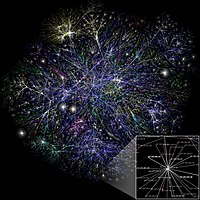
Photo from wikipedia
Semantic image segmentation is one of the most challenged tasks in computer vision. In this paper, we propose a highly fused convolutional network, which consists of three parts: feature downsampling,… Click to show full abstract
Semantic image segmentation is one of the most challenged tasks in computer vision. In this paper, we propose a highly fused convolutional network, which consists of three parts: feature downsampling, combined feature upsampling and multiple predictions. We adopt a strategy of multiple steps of upsampling and combined feature maps in pooling layers with its corresponding unpooling layers. Then we bring out multiple pre-outputs, each pre-output is generated from an unpooling layer by one-step upsampling. Finally, we concatenate these pre-outputs to get the final output. As a result, our proposed network makes highly use of the feature information by fusing and reusing feature maps. In addition, when training our model, we add multiple soft cost functions on pre-outputs and final outputs. In this way, we can reduce the loss reduction when the loss is back propagated. We evaluate our model on three major segmentation datasets: CamVid, PASCAL VOC and ADE20K. We achieve a state-of-the-art performance on CamVid dataset, as well as considerable improvements on PASCAL VOC dataset and ADE20K dataset
Journal Title: Cognitive Systems Research
Year Published: 2019
Link to full text (if available)
Share on Social Media: Sign Up to like & get
recommendations!